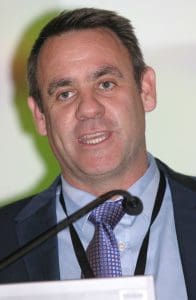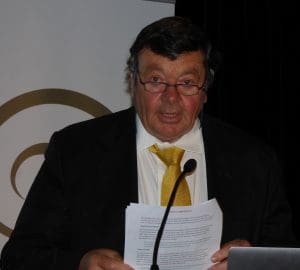
MLA managing director Richard Norton
‘SHOOTING the messenger’ to stifle industry discussions on mulesing has not worked for Australian Innovation chairman Wal Merriman this time.
Meat and Livestock Australia managing director Richard Norton confirmed today the MLA board has stood behind him and his recent mulesing and sheep welfare strategy comments, despite complaints from the AWI leader.
“The MLA board has written to Wally Merriman saying that they fully support their managing director,” Mr Norton said.
Mr Merriman today denied he tried to get Mr Norton sacked over his comment that the sheep meat industry was “very exposed” over mulesing.
But consistent with past AWI efforts to stifle media and industry discussions on mulesing, Mr Merriman did call MLA chair Michele Allan to voice his concern over Mr Norton’s recent comments on the consumer risk posed by the on-farm surgical procedure done to prevent flystrike in sheep.
A spokesman for MLA chair Michele Allan said she is not recommending any action be taken by the board as a result of Mr Merriman’s concerns about Mr Norton’s comments.
“The board is fully supportive of Mr Norton’s leadership of MLA and the outcomes MLA is delivering on behalf of red meat levy-payers,” the spokesman said.
WoolProducers Australia chief executive officer Jo Hall said AWI has not wanted to speak publicly about the risk mulesing posed, because it not want the issue to be played out in the media.
“However, when there are calls from the trade and our own customers to do something about this, I’m not sure that you can ignore it and not say anything.”
Three weeks ago, in answering a question at the BestWool BestLamb Conference, Mr Norton said the sheep meat industry was “very exposed” on the issue of mulesing. He said one of the “great exposures” to him as a marketer of Australian red meat in America and across Europe was antagonists showing images of mulesed sheep.
The MLA leader said a number of people came up to him at the Australian Sheep and Wool Show who were “very aggrieved and indicated that my position … that I would be out of a job.”
He said it was not difficult to conclude “when someone rings the chairman of my board seeking to discuss the conduct of the CEO, what might be going on.” At an Australian Sheep Breeders Association dinner at the show, Mr Norton also said he had been warned by the industry not to use the ‘mulesing’ word.
However, Mr Merriman said he “never, ever” asked for Mr Norton to be sacked.
“I never called the MLA to call for Richard Norton’s demise – Richard Norton’s job.
“I called chair to chair, which is my role, and I voiced my concern on his comments over mulesing.”
Mr Merriman did not accept that Australian sheep meat industry is exposed over the issue of mulesing. When Sheep Central suggested the sheep industry was concerned about the risk posed by consumer concerns over mulesing, Mr Merriman said “The whole industry isn’t, Richard Norton is.”
Sheep industry people frightened to talk
However, Mr Norton said he has had more emails from sheep producers who had stopped mulesing through on-farm practices and genetics, and thought he had defended mulesing, than from those who believed he had criticised the practice, with his recent comments.
“So I’ve been shot certainly as the messenger — I’ve taken both barrels of a shotgun.
“I think that you are exactly right, that the messenger has been shot, when the message is ‘that we have no strategy’,” he said.
“If (the sheep) industry was attacked on its animal welfare credentials tomorrow, we have no strategy …. on animal welfare.
“The consumer is king and can change markets overnight – an animal welfare strategy across the whole industry is critical,” Mr Norton said.
“Global macros trends clearly demonstrate consumers want to know where food comes from and on farm practices to build trust.
“If Australian producers embrace the opportunity, our on farm prices have a chance against all the head winds around environment and animal welfare concerns,” he said.
“We should be proud of what we do and tell our story.”
Mr Norton said people have called MLA frightened to have a conversation about supporting MLA “in this endeavour” – the need for an Australian sheep industry consumer strategy on animal welfare.
“The change has got to happen.
“There are people out there who are frightened about funding, they are frightened about their jobs,” he said.
“In this situation yes, both sides of the story have attacked me, but most people know that I am not one for walking away from an issue that I believe to be detrimental to the long-term viability and profitability of our industry.”
Consumer support is a key MLA performance indicator
Mr Norton said the industry was still at risk from consumer sentiment turning against the industry over its animal welfare practices and affecting demand and market access.
“If someone doesn’t pop their head up and say we’ve got to address this issue, and it is now the simple fact that much of our on-farm income is derived from the meat of the sheep, we are going to go backwards.”
The MLA leader said the number one key performance indicator for him under the first pillar of the Sheep Industry Strategic Plan 2020, was that he never lose more than 10 percent of consumer support for the sector.
“It’s at 93pc, so the 7pc that doesn’t (support the industry) are either because of animal welfare or environmental reasons.
“But if we had a major issue, that would fall below 90 percent and then I wouldn’t meet the key performance indicator set out for me,” he said.
“If we don’t take ownership of these issues someone else will tell us how to run our farms.”
High wool prices show AWI’s mulesing strategy is working

AWI chairman Wal Merriman
However, Mr Merriman said the wool industry does have a strategy for handling the risk posed by consumer concerns over mulesing.
“The wool industry is very satisfied with the strategy.
“We work with the early stage processors and the retailers and we use the science to fund pain relief and mulesing alternatives.”
Mr Merriman said despite a $25 million investment, finding a mulesing alternative had proven difficult and prospects such as Skintraction and liquid nitrogen were still research projects “at this stage.”
“At the moment, we have pre pain relief and post pain relief, the same as any human operation.”
On whether there was a need for another industry strategy including mandatory pain relief, Mr Merriman said: “We will see what MLA comes up with, they’re going to enter the field now.”
“Go and have a look at the wool price, it’s up.
“The wool market is up.”
But when asked if he considered that the wool industry did not have a problem with mulesing because of the current high prices, he said: “It’s a bloody good pointer.
“What’s the problem, when the wool market goes up?
“That tells me that the trade has accepted AWI’s efforts in all, but (also) in mulesing.
“There is no discount for mulesed wool.”
SCA-MLA relationship success
Mr Norton said the Sheepmeat Council of Australia and MLA have been working on the pain relief product NumNuts, which will be an animal welfare solution to tail docking and castration.
“That’s a strategy that tells the consumer that we care about our animals – it’s as simple as that.”
He said the SCA and the MLA have worked on pain relief for all surgical procedures to meat sheep that are effective and can be done in a fast manner so the industry could say that all surgical procedures are done with pain relief.
“That is a strategy.”
Mr Norton said he went to great lengths at Bendigo at the weekend to explain that the growth, development and success of the lamb industry has been because of a mature respectful and a business-like relationship between the Sheepmeat Council of Australia and MLA.
“I’m up to about 18,000 levy payers that I’ve been in front of in three years.
“I get a lot of frustrated levy payers talk to me and lately it has been around particularly footrot and how do we protect ourselves and our markets from the issue that European companies, large retailers will not buy Australian lamb because of the mulesing issue,” he said.
“For AWI to suggest that they don’t know that, and don’t know that footrot is a major issue to the sheep industry and to say that it hasn’t been discussed with them and they will play this out in the media is a little bit disingenuous.
“I’m only saying what levy payers are telling me,” Mr Norton said.
“MLA does not set industry strategies in isolation from its peak industry councils.”
Mr Norton would not comment on whether there was a need for an industry oversight body for AWI.

There are none so blind as those who can not see! Unfortunately there are too many people who see themselves as wool producers rather than sheep producers. Therein lies the the crux of the head in the sand attitude that exists here in one quarter. The world has moved on just a little since 1900, and we need to also – and rapidly.
The genetics and management techniques to cease mulesing are available in the Australian merino industry. Many successful seedstock and commercial producers stopped years ago and are willing to share their knowledge. Australian Merino producers don’t need to wait for industry leadership on this, they can make the change themselves.
Congratulations Richard, for not sticking your head in the sand. This issue will never go away. At the moment we are cushioned by international sheep numbers, but things can change rapidly. Long live the mighty Merino.
AWI does certainly need oversight; they are ruining the Australian wool industry. They are not listening to the markets and we are losing out to South Africa and Argentina. While AWI continues to protect mulesing and try to push pathetic useless pain relief to growers the markets are disintegrating. It is time the government took control and helped resurrect the Australian wool industry to it’s former glory. Genetics are the answer and we should be moving quickly to leave mulesing behind us.